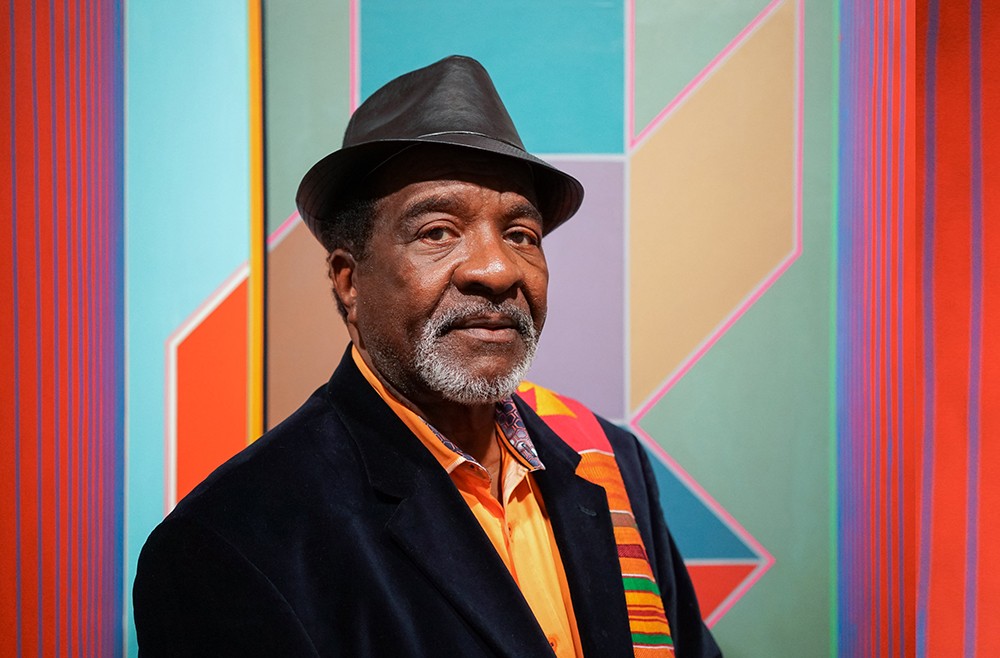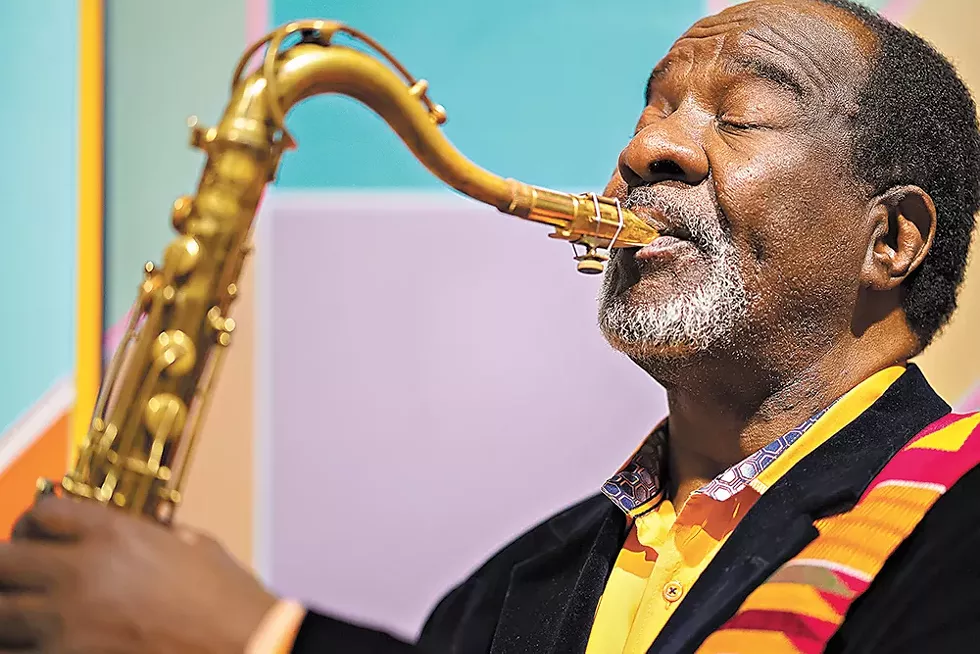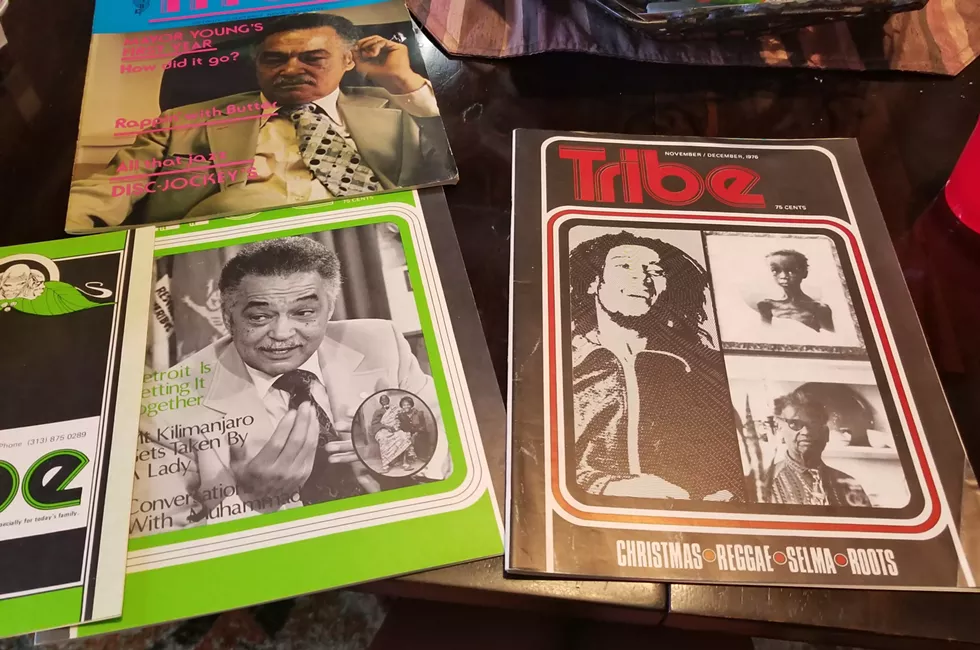Wendell Harrison says he was a "nervous child" when he was younger, and "full of energy." This is how he was introduced to music: In order to focus him, his mother started the boy on piano when he was 5 years old. From piano came clarinet at age 8, and then an alto saxophone he begged for so he could "play like the pros" at age 12. Eventually he switched to tenor saxophone, but the rest is history: A lifetime of jazz and a legacy of self-determination and dedication would follow. Now, at age 75, Harrison is the 10th artist to receive the Kresge Eminent Artist honor, announced in January, and $50,000 award for contributions to the art form and cultural community — a distinction he has more than earned.
Detroit-born Harrison is so much more than a tenor saxophonist and clarinetist. Other roles he has taken on — and continues to explore — include educator, bandleader, composer, and entrepreneur. He is perhaps most well-known as co-founder of Tribe, a 1970s collective that was instrumental in both shaping and spreading the sound of Detroit jazz at that time. Tribe was both a record label and magazine, but more than that, it was an organization that allowed black musicians to independently release and stay in control of their own creative output — a true do-it-yourself operation long before that model became commonplace for contemporary artists.
For our interview, Harrison is kind enough to invite me into his home in Detroit's North End, the very same house he has lived and worked in since the '70s during Tribe's heyday. I get a mesmerizing peek at some Tribe memorabilia as he leads me into the dining room, where he offers me apple juice as we get down to business. He is immediately warm and engaging, as expressive in his verbal storytelling as he is musically.
"I hated [practicing], because I had to sit still," Harrison says in describing his earliest musical experiences. "[But] after a while, I began to sit down and practice music for half an hour every day. That worked out pretty good. I'd shown progress. Then they gave me a clarinet. Boy, I was really mad then. Clarinet, at 8! I had to play that for maybe an hour, before I could go out and play with the kids around the neighborhood."
This went on throughout elementary school and middle school. Then Harrison started getting attention from girls.
"That was another attraction... [or] distraction!" he says with a laugh. "Because I was playing the clarinet in the orchestra, I was on display, I was visible. I learned how to play it pretty well. Practicing paid off. It got me out of English and history class. I thought, 'This is pretty good. I don't have to go to class, I can play this music, and then I got the attention of the girls. This is pretty good, this is working.' Then I really started practicing."
When he got to Northwestern High School, he met some guys who were playing live jazz. "I thought, 'Wow. I'd really like to play like that,'" he says. They were studying with pianist and bebop master Barry Harris; Harrison followed their lead and began studying under him as well. Soon enough, Harrison was playing out with frequency. He had a paper route and stock boy job to help offset the price of his saxophone — a deal made with his mother — but soon enough he was able to quit. Playing music was making him money.
By the time Harrison was 16, the guys who showed him jazz (they were a couple years older than him) had left for New York. "It seemed like I was here all by myself," he says. "Then the folks in New York heard about me, and they were talking about giving me some jobs. If I decided to move there, I would be taken care of. I tried to hurry up and get out of school because I was thinking if I graduate from high school, my parents will let me go."
He graduated at 16, but it wasn't that simple. "They said, 'No, you got to go to college.' I said, 'Oh, I'm not going to do that. So I went to junior college for a semester and one day I just packed up," he says.
"I don't know how I did it, but I ended up in New York at 19," he adds. It was there that he met and performed with several legendary jazz musicians across the wide spectrum of the genre that would come to inform his multi-faceted approach: the bluesy bop and soul jazz guitarist Grant Green; R&B, soul jazz, and hard bop saxophonist and arranger Hank Crawford; and nonpareil avant-garde explorer Sun Ra.
When Harrison got to New York, he wound up living in a loft near Chinatown with a bunch of other Detroit players. "We got oriented by New York and the music industry there," Harrison says. Detroit musicians looked out for one another, but it wasn't unique to the Motor City — musicians from the same cities all tended to look out for each other. "We're tribal like that, family-oriented," Harrison says.
Big name musicians from saxophonist Sonny Rollins to pianist Thelonious Monk would stop by the loft to practice with the young kids from Detroit. When a musician would need a particular type of player, they would make calls around to the different lofts. One of Harrison's first big breaks came this way, when Green's manager called the Detroit loft looking for a saxophonist.
Green, who himself was more influenced by saxophonists than guitarists, expanded Harrison's understanding of the bebop tradition he had learned studying under Barry Harris in Detroit. "He showed me how to project and keep the interest of the listener. He said, 'You know all this fancy stuff, but pace yourself. Don't play all your stuff in one bar. Play more melodic,'" Harrison says. "I learned a lot from him, and I began to tell stories with my playing."
Harrison also learned a lot from Hank Crawford, who had been Ray Charles' arranger and director. He taught Harrison how to write for ensembles and large bands; Harrison toured with Crawford's band and recorded four albums with him in the mid '60s, one of which (1966's After Hours) contains his first recorded solo on the soulful track "Junction." When he joined the band, Harrison was also given the opportunity to present his own original compositions, as he had begun writing his own music by then.
A third figure that may not be as stylistically connected to Harrison's playing but is very much conceptually related is proto-Afrofuturist pianist and composer Sun Ra. "I learned how not to play the changes with him," Harrison says. "When I started with him, he said, 'I don't want you to play no changes. Just give me imagery. I want bird sounds. What does an elephant sound like passing gas?' Imagery!"
Sun Ra was telling Harrison to focus on the sounds of nature, organic sounds that already exist. "I integrated that into my blues and jazz, but I had to practice that stuff," Harrison says. "I was so academic, precision-driven, and regimented. I had to loosen up and use my imagination."
In other words, Sun Ra taught Harrison that you learn the rules in order to break them later on. But what he taught him extended beyond musical rules, too. Harrison saw that you didn't have to play by the industry's rules, either; Sun Ra was in control of his own records, publishing, and management.
"He was self-contained," Harrison reflects. "He had his own autonomy. He played what he wanted to play as long as the people showed up, and he built an audience on what was in his mind. So I said, 'This is great. You can rule your own. You don't have to be subject to other folks' opinions... You can do what you want to do.'"
Sun Ra wasn't necessarily preaching how to run one's own business, but Harrison was observant. He tried to figure out how Sun Ra ticked, what motivated him, and how he worked. At the same time, Harrison was doing sessions for other people and trying to get his own contract with Atlantic. But he was never satisfied with the deals that were presented to him.
No one could tell Sun Ra what to do, and his example was helpful to Harrison when he came back to Detroit and started Tribe Records and Tribe magazine. "I'd seen it done in real life! It was a dream, but I saw it," he says with pride. "It was already manifested. Sun Ra gave that to me."
When Harrison returned to Detroit, he began teaching at Metro Arts, an inner-city youth organization. It was there that he deepened his friendships with the future members of Tribe, including the late trumpeter Marcus Belgrave, the late pianist Harold McKinney, and trombonist Phil Ranelin.
Thus began Tribe, formally co-founded by Harrison and Ranelin in the early '70s. Each musician would own their own product, but as a collective they could work together to distribute the music and spread the message. "To get the attention of the industry, you had to be a company," Harrison explains. Under the Tribe name, they were able to get distributors to carry the records, radio DJs to play the music, and magazines to write about the label — as well as spread the word in their own magazine.
Drummer Gayelynn McKinney, the daughter of Harold (who was a few years older than the others, and often described as the glue that held them together), remembers her youthful wonderment at the business of Tribe. "The one thing that stood out to me, even when I was little, is that I was amazed at the fact that there was this whole business that was owned by African-Americans," she says. "I was even more amazed when I found out they had a magazine!"
The magazine was born out of expanding program books that accompanied live Tribe performances; the group raised money through selling advertising in these books. Author, journalist, educator (and former Metro Times contributor) Herb Boyd saw an opportunity to turn the written component into a publication, and with Harrison's encouragement, the magazine came to fruition.
"The magazine was about the culture and what was going on in the African-American community in Detroit," Gayelynn explains. "It was very cutting-edge and innovative for that time because a lot of African-Americans did not have their own businesses, let alone a magazine and a record company. This business [was] owned by an African-American who incorporated other African-American musicians who wanted to put their music out without being under a tether. They were totally creatively free, which was nice — that's why the music sounded the way that it did."
And that sound? It was at once spiritual and avant-garde, with plenty of groove, funk, and soul to stir the feet and political messages to stir the mind. The label only released a little over a handful of albums, originals which are now the stuff of crate-digger dreams; the music itself varied in tone from melodic to relentless, and often was both, but most importantly it represented the full creative spectrum of the artists involved.
The second album to come out on the label was Harrison's An Evening With the Devil in 1973, a political soul jazz tour-de-force with titles like "Mary Had an Abortion," "Where Am I," and "Angry Young Men."
"I was reflecting on civil rights, the laws of the courts and police brutality. It was very political, but I produced it in a creative way," Harrison says. "All the music that came out on Tribe had some type of political connotation because those were the times we were living in. We were living in protest days."
Tribe was not the only record label that Harrison founded, though. In the latter half of the '70s, the members began spreading out. Tribe wasn't exactly a moneymaker, so Ranelin headed to Los Angeles in search of work, while Belgrave was often on the road, here and abroad. Harrison founded two more labels to release his music as well as that of other Tribe-affiliated musicians: Wenha, which features much of Harrison's music of the '80s and '90s, and Rebirth, both a nonprofit educational organization as well as a label. Harrison started this project with his second wife, the pianist Pamela Samiha Harrison, and they continue to run it to this day.
‘All the music that came out on Tribe had some type of political connotation because those were the times we were living in. We were living in protest days.’
tweet this
Rebirth also produced tours and coordinated exchange programs with musicians from Paris, obtaining sponsorship from the National Endowment for the Arts. They brought in a clarinet ensemble from Paris to play with Harrison's clarinet ensemble, Mama's Licking Stick. They received grants to record as well, which is how the album Reawakening, featuring the late Leon Thomas on vocals, came to exist. Rebirth also began producing radio broadcasts with WDET-FM; twice a month they would bring artists onto former MT editor (and current Kresge Foundation communications officer) W. Kim Heron's show "Destination Out." In Harrison's view, the radio show became an anchor for other opportunities. "Rebirth, Inc. is a jazz label, but it's also a production company, managing company, and a musician's aid," he adds.
Rebirth also lends its name to a Tribe-related project that Detroit DJ, producer, and techno artist Carl Craig coordinated in 2007. Harrison, Ranelin, Belgrave, and Doug Hammond — a drummer and vocalist on the Tribe release Reflections in the Sea of Nurnen — came together to record fresh takes on Tribe classics as well as new material; that release was appropriately titled Rebirth, nodding to the past while simultaneously looking toward a new day.
Ranelin touches on this lifelong connection when asked about his relationship with Harrison. "Wendell is a man of his word with great integrity, it's part of his DNA," he says. "Since I relate to that and respect it so much, it's one of the things that's allowed us to remain friends and keep the mutual respect, as well as Tribe, alive for over 50 years."
It's not just the Rebirth release, either. Harrison has kept busy throughout the years licensing both Tribe and Wenha records for distribution on labels all across the world, from P-Vine in Japan to Soul Jazz in the U.K.
On top of that, Harrison is still producing, recording, and educating — he produced his wife Pamela Samiha Wise's latest album, A New Message from the Tribe, which came out last year and continues to keep the Tribe flame alive. Recent performances include a series on African rhythms, educating people about their role in jazz music by taking audiences on audio tours through well-known rhythms and their origins.
"I'm always experimenting with different textures," he says, a concept which is borne out by the details of his latest musical project: a unique big band ensemble which incorporates classical reeds that have been excluded from the jazz tradition like oboe, bassoon, and bass clarinet. In this project he is reinterpreting and rewriting suites that were originally written 10 to 15 years ago for his clarinet ensemble. The endeavor was commissioned by Chamber Music America to give the clarinet more exposure.
Harrison regularly teaches out of his own studio and is also a jazz educator in residence at the Detroit School of Performing Arts, teaching jazz phrasing and theory while sharing knowledge of jazz giants like Charlie Parker, John Coltrane, and Dizzy Gillespie. He also just co-authored a text called The Fundamentals of Marketing and Promotion for the 21st Century Musician with Dr. Robert McTyre from Spring Arbor University. Harrison himself obtained two degrees from Spring Arbor, a bachelor of science in 2014 and a Master's in communications degree three years later. His lifelong experience in production, marketing, and merchandising music makes this text a natural extension of his role as a jazz educator.
All of which brings us to the present. When Harrison found out that he had won the Kresge Eminent Artist award, he couldn't believe it. He laughs as he recounts that somebody said to him, "You better believe it!" He says he is profoundly grateful for the encouragement. "It really keeps you on the right track," he says. Recognition like this is energizing to him; at age 75, that's more important than ever. "It's a blessing," he says. "Much needed."
It's no small feat to have effectively been one's own boss for the majority of one's career; Harrison considers this a blessing too, although he also describes it as a double-edged sword. "I can't fault anybody but myself if things don't go right, [but] I'd rather be in that kind of position than to have somebody controlling me," he says. Many people aren't able to have this experience, although in Harrison's view, anyone is capable of it, at least on some kind of level.
"It's all about being free to do what you need to do for yourself," he says. "Owning your own resources, owning your own product, having control of your own destiny — all that means something to me. That means I'm free."
Stay on top of Detroit news and views. Sign up for our weekly issue newsletter delivered each Wednesday.




